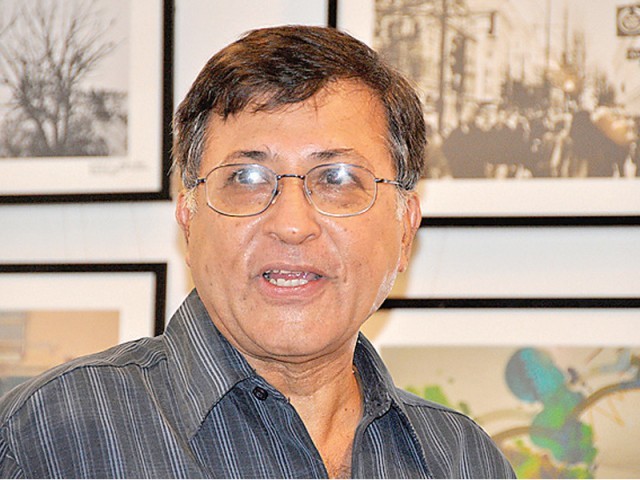
“Religion must be separated from the state,” Pervez Hoodbhoy said on Thursday.
He was speaking at the Forman Christian College on States Under Siege: Pakistan, Egypt and Syria.
Hoodbhoy joined the Forman Christian College Department of Physics as professor of mathematics and physics on September 2.
Hoodbhoy highlighted the need for states to keep religion out for the affairs of state.
“Theocratic states are unfair to monitories,” he said.
He said in theocratic states, a specific religious ideology was imposed on weaker groups. This created an unequal society.
In Pakistan, he said, the society was currently in a state of confusion.
“When you demand a state on the basis of religion, the question is which particular variant of that religion is being demanded?” he said.
On the recent ouster of Egyptian President Mohamed Morsi, Hoodbhoy said the people of the country should have been more patient with the democratic process. However, he said, they had the right to change their minds.
He expressed his reservations over the use of force by the military on pro-Morsi supporters.
He said the United States wanted to intervene in Syria for its own geo-political interests, not for humanitarian reasons.
“Weak states are prone to all kinds of disasters and collapse,” he said. “So is Syria.”
He said the state was internally weak because of the strong opposition of the Sunni rebels. The lecture was attended by a large number of students and faculty.
Published in The Express Tribune, September 7th, 2013.
COMMENTS (9)
Comments are moderated and generally will be posted if they are on-topic and not abusive.
For more information, please see our Comments FAQ

















@arshad , can a non muslim be head of a state in islamic state? if no then it is unfair and we reject it.
We first need to educate the Pakistani nation about difference between religious beliefs and religious principles. Jinnah wanted the Islamic democratic state based on Islamic principles. When it comes to politics based on Islamic principles, and then there are no or very little differences among existing schools of thoughts in today’s Muslim world. This is the very important point which we need to emphasize as religious differences are only connected with religious ideology. No sect denies or disagrees with Islamic social, economic and political laws. Islamic state should handle its affairs abiding those laws based on Islamic principles. We cannot enforce Sunni, Shia or any other ideology on society because an ideology is based on believes of an individual who have the full right to agree or disagree. In that you can accommodate all kinds of belief systems in an Islamic society. The leader of the state can be anyone who is ready to deliver his responsibilities under the Islamic laws or jurisprudence just like the constitution of any independent state. Talking about the rights of minorities, they are fully independent to follow their religion and it will never create any conflict with laws of an Islamic state in that way. The religious personalities like Mullahs etc. may not be involved in power because if they are in power then in case of corruption or bad governance it creates a chance to blame religion for the bad doings of the politician and people start getting negative impression regarding role of religion in state affairs. The law is the criteria not the ideology. Ideology will further flourish with society if politics will be based on Islamic principles.
@S!D. Have you ever thought that maybe it is you who doesn't understand Islam?
Please listen to the good professor and people like Ghamdi to unshekel your mind.
May Allah give you guidance and courage to seek the knowledge.
@SID Rulers are expected to rule with fairness to all its Citizens. Rulers are to protect their subjects and their belongings. When the Rulers show their conviction thru their actions on this Divine rule, minorities need no fear, be it Pakistan or India !
Congratulation for joining FCC and also for speaking truth as you always do_thank you.
@Indian critic: great comment
I totally disagree with Professor sb. Religion is not separate from state as Islam does not separates religion and worldly deeds (Deen aur Duniya). In Islam, a ruler is accountable for his nation and will be punished or rewarded for his work in afterlife. But to understand this you need faith which we lack. People, both minorities and Muslims alike, have been suppressed in Pakistan because rulers were/are not God-fearing. Secular may attack me but this is how it is.
Secularism, democracy and other modern progressive ideas are very difficult to implement in a society that is illiterate and uses traditional rules and laws to govern itself. Pakistan could have achieved all this, but the nation's Father died soon after creating, before he could stabilize the political scene. Jinnah was a modern and tolerant leader, but alas, the series of corrupt leaders along with self-serving military leader ensured Pakistan remained backward and poor. Unless the nation becomes fully literate and there is a stable democratic government that promotes tolerance, the country has no hope for a brighter future. Even in India which is a democracy, from time to time the foundations of democracy is tested by its illiterate people and its moronic and corrupt politicians. So many innocent people are killed in riots because democracy breaks down from time to time and there is no rule of law nor an efficient delivery of justice. India has many functioning democratic institutions but it has at best a flawed democratic foundation. Because the people are illiterate just like the people in Pakistan.
There is no chance Pakistan is going to separate religion from the state in the foreseeable future. Even now with over 50.000 people killed, most Pakistani are still in denial about the role of religion in society. This has lot to do with the absence of rational thinking in education and upbringing. People are suffering from mullah type education where they are ingrained to think Islam should be "superior" to all religions. Proper education opens the doors for critical thinking, hence an open mind, therefore questioning commonly held philosophies and/or beliefs which will eventual lead to a larger secular population who don't rely on rules, regulation and dogmas already set in stone. To have unity among a diverse range of people one has to have tolerance for others - a rare commodity among Muslims and with self-righteous attitude, black and white theories and attitudes there is very little hope for progress in this regards. We are not talking about change in years, or even decades, but possibly in centuries for the greater part of the Muslim world.